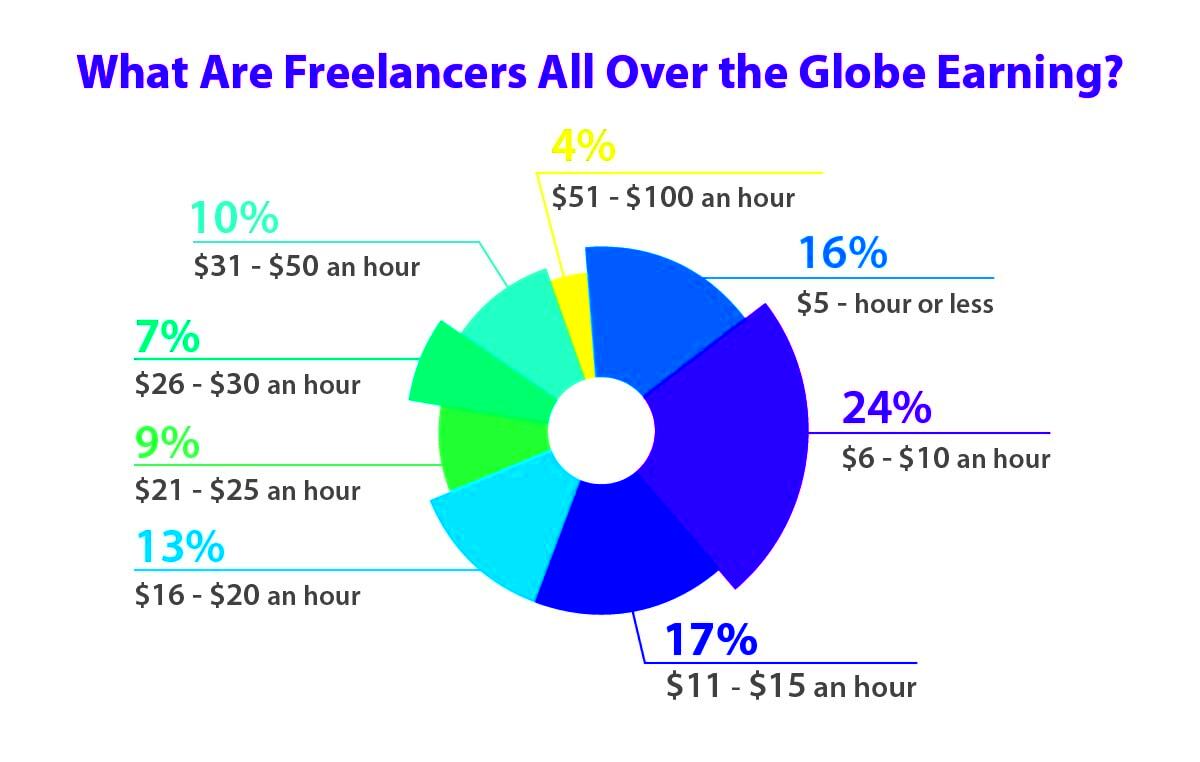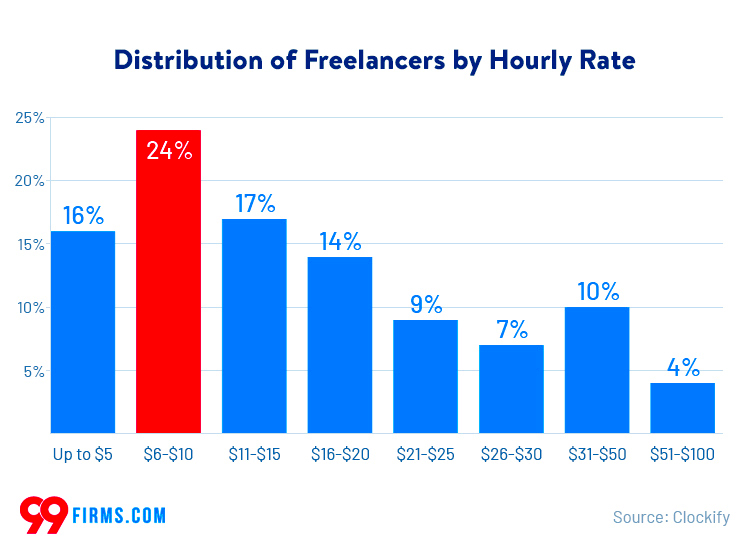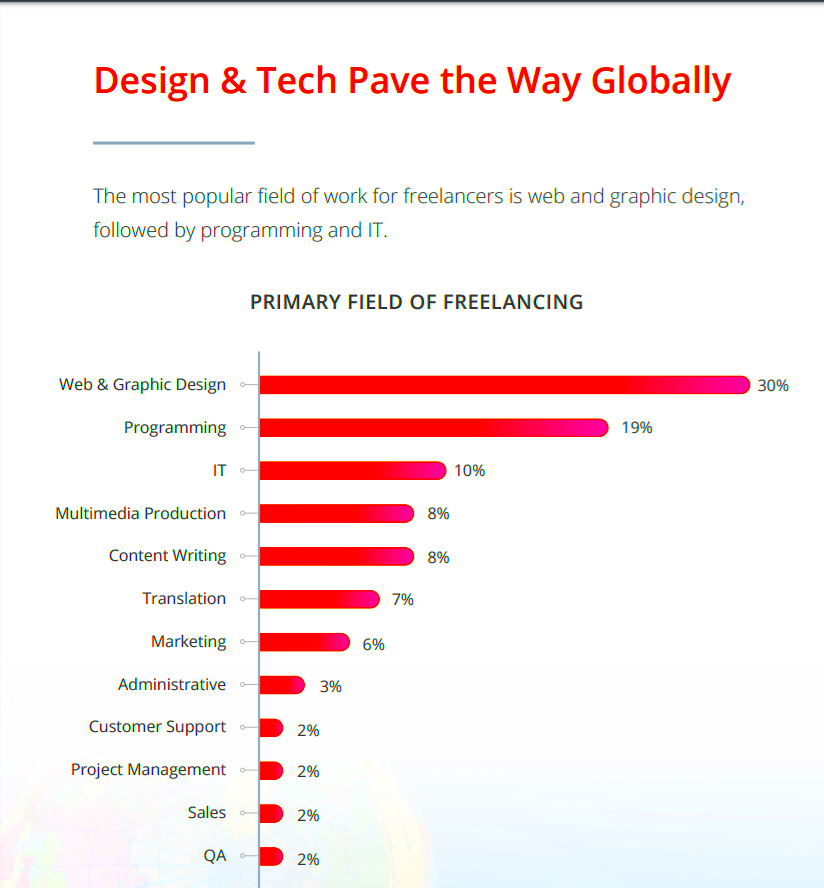Freelancing has become a popular way to earn money, offering flexibility and the ability to work on diverse projects. However, the amount freelancers can earn varies greatly depending on their field, skills, experience, and the demand for their services. In this post, we will explore how much freelancers earn across different industries, helping you understand what to expect if you're considering a freelance career or want to improve your earning potential.
Freelancing Opportunities in Writing and Content Creation

Writing and content creation have become essential in today’s digital world, with businesses and individuals constantly in need of high-quality content. Freelancers in this field can work as copywriters, bloggers, technical writers, SEO specialists, and more. The pay varies depending on the type of work and the client's budget.
Some common writing and content creation services include:
- Blog posts and articles
- Copywriting for websites and ads
- Technical documentation
- SEO content writing
- Social media content
Freelance writers can earn anywhere from $20 to $100 per hour, depending on their experience and niche. For instance, a blog post might range from $50 to $500, while more specialized writing projects, like technical writing or SEO-focused content, may bring in higher rates. Established freelancers with a strong portfolio can command even higher rates, sometimes reaching $1,000 per article.
Also Read This: How Much Does Fiverr Pay Writers?
How Much Can Freelancers Earn in Graphic Design?

Graphic design is another popular freelance field, with opportunities in areas such as logo design, branding, website design, and illustrations. Like writing, earnings vary based on experience, expertise, and project complexity. For example, a simple logo design might earn around $100–$300, while a complete brand package could bring in $1,000 or more.
The table below shows average hourly rates based on experience level in graphic design:
| Experience Level | Hourly Rate |
|---|---|
| Beginner | $20–$30 |
| Intermediate | $30–$50 |
| Experienced | $50–$100+ |
Freelancers who specialize in areas like web design or UI/UX design tend to earn more, with rates reaching as high as $100–$150 per hour. Experienced designers can also earn a premium for large projects, such as designing complete brand identities or building high-end websites.
Also Read This: The Earnings Potential of a Freelance Editor
Income Potential for Web Development Freelancers

Web development is one of the most lucrative fields for freelancers. As more businesses move online, the demand for skilled web developers continues to grow. Freelancers in web development can work on a variety of projects, including building websites, developing apps, or even offering specialized services like eCommerce or WordPress development. The income potential is high, but it depends largely on the complexity of the project and the developer's expertise.
Web developers can specialize in several areas, such as:
- Frontend development (HTML, CSS, JavaScript)
- Backend development (PHP, Python, Ruby)
- Full-stack development
- eCommerce development (Shopify, WooCommerce, Magento)
- Mobile app development
For web development freelancers, the average hourly rate typically ranges between $30 to $150, depending on their skill level and the project scope. For example:
| Experience Level | Hourly Rate |
|---|---|
| Beginner | $30–$50 |
| Intermediate | $50–$100 |
| Experienced | $100–$150+ |
For large-scale projects, developers can earn from $2,000 to $10,000 or more, depending on the requirements. Full-stack developers and those who specialize in niche technologies like React or Node.js often command higher rates, making web development a top choice for high-earning freelancers.
Also Read This: How to Delete Your Fiverr Gig: A Step-by-Step Guide
Freelance Earnings in Marketing and Social Media Management
Marketing and social media management are key areas for freelancers, especially as businesses need to build their online presence and grow their customer base. Freelancers in this field can work as social media managers, content marketers, email marketers, SEO experts, and more. The income in marketing depends on the services offered and the client base, but it can be quite profitable with the right expertise.
Some of the common services freelancers offer in marketing and social media management include:
- Social media account management
- Content marketing (blogs, newsletters)
- Search Engine Optimization (SEO)
- Paid advertising (Google Ads, Facebook Ads)
- Brand strategy and consulting
Freelancers in marketing typically charge an hourly rate or project fee. Here's a breakdown of what you might expect to earn:
| Role | Hourly Rate |
|---|---|
| Social Media Manager | $20–$75 |
| SEO Specialist | $30–$100 |
| Content Marketer | $40–$100 |
Experienced social media managers or digital marketers can earn more than $100 per hour or charge a flat fee for campaign management, sometimes reaching $5,000 or more for comprehensive marketing packages. Those who specialize in paid ads or SEO can also see higher earnings, particularly with long-term clients.
Also Read This: How to View Buyer Requests on Fiverr
How Much Do Freelancers Earn in Video Production and Editing?
Video production and editing are in high demand, especially with the rise of online video content. Freelancers in this field work on a wide variety of projects, from corporate videos and commercials to YouTube content and event coverage. With the increasing need for quality video content, the earning potential is significant, but it can vary based on the complexity of the project and the freelancer's experience level.
Video production and editing services can include:
- Video editing (cutting, splicing, color correction)
- Motion graphics and animation
- Filming and videography
- Scriptwriting and storyboarding
- Post-production sound editing
The average hourly rate for video production and editing freelancers is typically between $30 to $100, but experienced video editors or those who work on high-end projects can earn much more. Here's an idea of what video freelancers might charge:
| Experience Level | Hourly Rate |
|---|---|
| Beginner | $30–$50 |
| Intermediate | $50–$75 |
| Experienced | $75–$150+ |
For larger video production projects, freelancers can earn between $2,000 and $10,000, depending on the length and complexity of the video. Those working with high-profile clients or in specialized areas such as animation, 3D design, or high-end corporate videos can earn significantly more, making video production a well-paid field for skilled freelancers.
Also Read This: Can You Sell eBooks on Fiverr? A Complete Guide
Factors Affecting Freelance Earnings in Different Fields
Freelance earnings can vary greatly depending on a range of factors, not just the field of work. Understanding these elements can help freelancers make informed decisions about their career path and maximize their earning potential. From skill level to market demand, these factors all play a role in determining how much freelancers earn across different industries.
Some key factors that affect freelance earnings include:
- Experience and Skill Level: More experienced freelancers typically command higher rates due to their established track record and expertise.
- Specialization: Niche skills often lead to higher pay, as businesses are willing to pay more for specialized knowledge.
- Location: Freelancers in high-cost areas or regions with a high demand for certain skills can charge more for their services.
- Client Base: Freelancers who build strong relationships with reliable, high-paying clients tend to have more stable and higher earnings.
- Market Demand: The need for specific services in a given market can significantly impact how much freelancers earn. High-demand skills such as web development or SEO tend to offer higher pay.
- Reputation and Portfolio: Freelancers with a strong portfolio and good reviews from clients are able to charge higher rates because of their proven ability to deliver quality work.
- Workload and Hours: Freelancers who take on more projects or work longer hours can earn more, though this depends on the type of work and the freelancer’s capacity.
By understanding and optimizing these factors, freelancers can better position themselves to increase their income, regardless of their chosen field.
Also Read This: How to Resume a Paused Gig on Fiverr
Frequently Asked Questions
Here are some common questions about freelance earnings:
- What is the average hourly rate for freelancers? Freelance rates vary widely depending on the industry, experience, and location. On average, freelancers charge between $20 and $100 per hour.
- How can I increase my freelance earnings? Specializing in a niche, improving your skills, building a strong portfolio, and networking with potential clients are key strategies to increase earnings.
- Is freelancing a stable source of income? Freelancing can provide a stable income, but it depends on your ability to secure consistent work. Having multiple clients and diversifying your skill set can help maintain stability.
- How much should I charge for my services as a beginner? Beginners may start at lower rates, typically between $20–$30 per hour, to build their portfolio and gain experience. As you grow, you can gradually increase your rates.
- Can I earn a full-time income from freelancing? Yes, many freelancers earn full-time income by building a steady stream of clients, managing multiple projects, and optimizing their skills to meet market demand.
Conclusion: Understanding Freelance Income in Various Fields
Freelance earnings vary greatly depending on the industry, skill set, and other factors. While some fields offer higher earning potential, others may require more time and experience to reach a sustainable income level. Ultimately, understanding the factors that influence income and strategically building your career can help you achieve success as a freelancer. Whether you’re just starting out or looking to grow your freelance business, there are numerous opportunities to earn a comfortable living across different fields.
Remember that freelancing comes with its challenges, but it also offers a level of flexibility and autonomy that traditional jobs often lack. By continuously improving your skills, networking, and staying informed about market trends, you can increase your earning potential and find the right balance of work and income.




